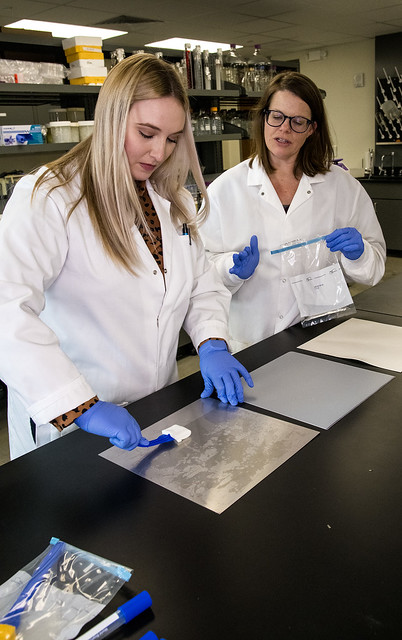March 2, 2022
Future of Food Fellowship Program seeks food science crossover undergraduates
By John Lovett
U of A System Division of Agriculture
Fast facts
- Future of Food Fellowship Program opens doors to undergrads outside of food science
- 10-week paid summer program teaches research, leadership, communication, and team-building skills
- USDA National Institute of Food and Agriculture grant supports five-year program
(735 words)
Related PHOTOS: https://flic.kr/s/aHBqjzEmaU
Download MS Word version:
Editor's Note: The application deadline has been extended to March 28.
FAYETTEVILLE, Ark. — The Future of Food: Opportunities and Careers for Undergraduate Students (F2OCUS) Fellowship Program is a new 10-week, summer research and extension opportunity coming to Fayetteville in 2022.

Applications are due on Friday, March 11, for the 2022 summer F2OCUS program to be held May 30-Aug. 5. Applicants will be chosen by April 1 and notified the following week. Room and board are provided to F2OCUS fellows, along with a $4,800 stipend and travel support.
Food science researchers with the Arkansas Agricultural Experiment Station, the research arm of the University of Arkansas System Division of Agriculture, secured a $730,000 grant from the U.S. Department of Agriculture’s National Institute of Food and Agriculture to conduct the research and extension program for the next five years, focusing on minority recruitment.
“We are hoping to get applicants with diverse perspectives and backgrounds to grow the future leaders in food science,” said Kristen Gibson, F2OCUS Fellowship Program director and associate professor in the Food Science Department.
The program aims to increase understanding of food supply safety, quality, and security for undergraduates in complementary degree programs, including biology, chemistry, consumer sciences and agricultural studies.
Gibson said that food science research at the Arkansas Agricultural Experiment Station covers a wide gamut, but some examples of potential research projects for F2OCUS fellows include food ink development for 3D-printed food products; alternative protein sources to treat and prevent chronic diseases; nanoscale food-grade materials; new techniques to control harmful grain molds and mycotoxins; ways to cut down on foodborne pathogens in low-moisture foods; and researching issues that affect rice quality.
Eight undergraduates who are not enrolled in a food science program will be chosen to spend the summer in Fayetteville, Gibson said. Fellows will work with faculty mentors on real research projects before showcasing their work at an end-of-program symposium.
Along with Gibson, fellowship project directors include food science faculty members Jennifer Acuff, assistant professor of food microbiology and safety, and Jamie Baum, associate professor of nutrition. Jill Rucker, associate professor of agricultural education, communications and technology for the Dale Bumpers College of Agricultural, Food and Life Sciences at the University of Arkansas, is also a project director and fellowship mentor.
In addition to the four project directors, 10 collaborating mentors with extensive mentoring experience have been chosen to assist with the fellowship program. Industry partners, many of whom are University of Arkansas graduates and serve as adjunct faculty, will also participate in the fellowship program.
Gibson said collaborating mentors will be paired with fellows based on their chosen research projects. There may be instances where mentors will co-mentor one student if the project is multidisciplinary.
The fellowship program will also work closely with the Ozark section of the Institute of Food Technologists, whose members represent all areas of the local food industry, from packaging and manufacturing to research and development.
While scientific research is a significant part of the fellowship, there is also a heavy emphasis on team building, leadership development, and communications skills.
“Communication of scientific research to stakeholders and the general public is a critical skill to develop,” Gibson said. “One cannot just restate the data and expect everyone to understand how to use it. As researchers, we must provide guidance on how the data can be used and translated into practice for real-world application.”
The first weekend of the program includes team development exercises with the 4-H ExCEL Leadership Program at the Arkansas 4-H Center in Little Rock. Other field trips will consist of the Tyson Foods Discovery Center, a Simmons Foods’ product development lab, and the Experiment Station’s Fruit Research Station in Clarksville.
To be considered for the fellowship, applicants must write a personal essay that tells their background and life history, long-term goals, and an explanation of how this summer program will help address their career goals. Applicants also need to submit a letter of reference, resume, and unofficial transcript.
Gibson said the application deadline may be extended if there is a need to broaden the applicant pool.
To learn more about the program and apply, visit https://future-food-reeu.uada.edu.
To learn more about Division of Agriculture research, visit the Arkansas Agricultural Experiment Station website: https://aaes.uada.edu/. Follow us on Twitter at @ArkAgResearch.
To learn about Extension Programs in Arkansas, contact your local Cooperative Extension Service agent or visit https://uaex.uada.edu/. Follow us on Twitter at @AR_Extension.
To learn more about the Division of Agriculture, visit https://uada.edu/. Follow us on Twitter at @AgInArk.
About the Division of Agriculture
The University of Arkansas System Division of Agriculture’s mission is to strengthen agriculture, communities, and families by connecting trusted research to the adoption of best practices. Through the Agricultural Experiment Station and the Cooperative Extension Service, the Division of Agriculture conducts research and extension work within the nation’s historic land grant education system.
The Division of Agriculture is one of 20 entities within the University of Arkansas System. It has offices in all 75 counties in Arkansas and faculty on five system campuses.
Pursuant to 7 CFR § 15.3, the University of Arkansas System Division of Agriculture offers all its Extension and Research programs and services (including employment) without regard to race, color, sex, national origin, religion, age, disability, marital or veteran status, genetic information, sexual preference, pregnancy or any other legally protected status, and is an equal opportunity institution.
# # #
Media Contact: John Lovett
U of A System Division of Agriculture
Arkansas Agricultural Experiment Station
(479) 763-5929
jlovett@uada.edu